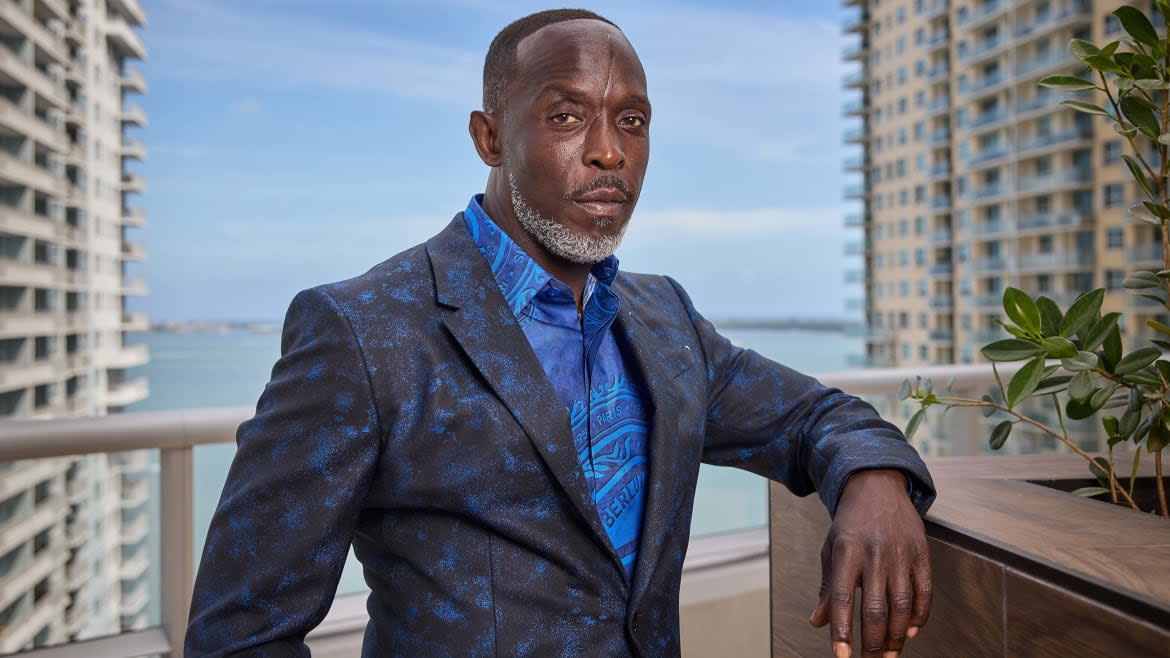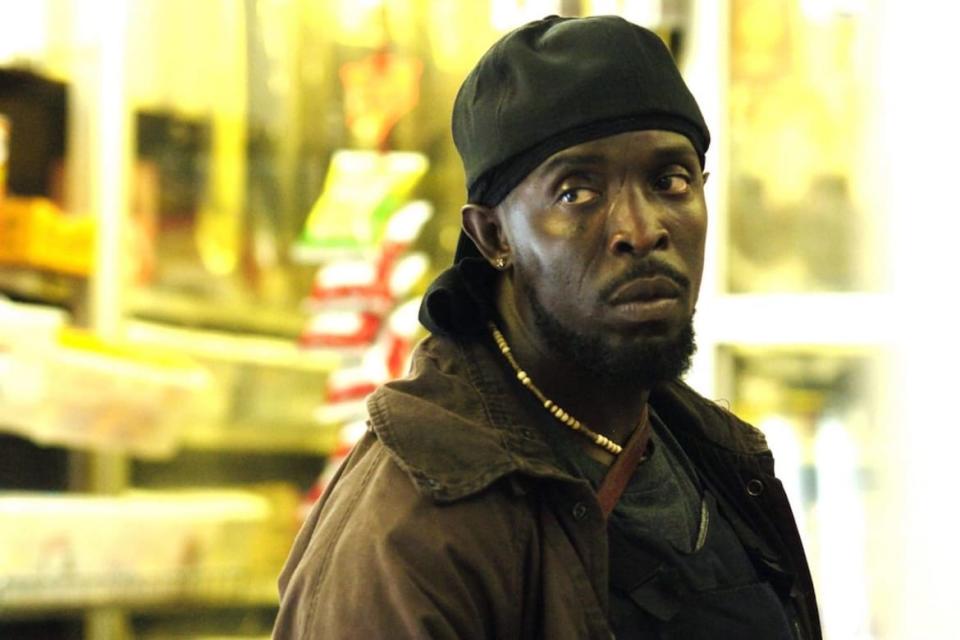Michael K. Williams Brought Fire Like We’d Never Seen Before

- Oops!Something went wrong.Please try again later.
- Oops!Something went wrong.Please try again later.
- Oops!Something went wrong.Please try again later.
Michael K. Williams led his life with anger, and with a smile. The smile is the first thing you notice, as I did when we met for lunch to discuss his career a little over two years ago. In the day since the actor was found dead at age 54 in his Brooklyn apartment, the outpouring of stunned tributes have been largely defined by that smile—recollections from all who worked with or met him about how blinding, how disarming, and how soulful that flash of a grin was as he entered every room.
But the anger was there, too, almost always. Not anger in a toxic way, or in a manner that is so often weaponized against people of color. It was a purpose; the engine that generated his work.
He almost didn’t survive to have his fruitful career, an unimpeachable resume of performances in some of the greatest cable-television series of all time: Boardwalk Empire, The Night Of, When They See Us, and, most memorably, The Wire, on which he played Omar Little. Before his death, pundits had already pegged him as an early favorite to win the Emmy Award for his work on the HBO series Lovecraft Country at the Sept. 20 ceremony.
That anger was a tool in those standout performances, and also a motivator: The work should count. He lived, so his art should say something. He owed it to the way he was brought up, to his survival. He owed it to the friends and family who didn’t make it out of the projects in East Flatbush, where he grew up, and didn’t have his opportunity—the people who didn’t get, as he would admit, life’s second, even third, chances.
Michael K. Williams Almost Didn’t Survive to Be This Angry
When he began work as an activist for prison reform, inspired by his relationship with his nephew who was serving a 25-to-life sentence, and collaborated with The Innocence Project, he found himself in a conference in The White House sitting opposite then-President Barack Obama discussing the incarceration crisis.
It was an awakening, he told me then. “President Obama cares about what I think? Fuck-all what I do in Hollywood. I’m a recovering addict with a remedial education, you can’t possibly care what I think about things. President Obama is asking me shit? And not, ‘Oh, hey, Omar!’ But actually what do I think about shit? That blew me away.”
He worked with the ACLU, and would often use the platform given in interviews to talk about criminal justice reform, the school-to-prison pipeline, systemic racism, and the Black Lives Matter movement. With each role, he carried with him his own struggles and traumas, and imbued his performances with that personal fire.
In Ava DuVernay’s Netflix series When They See Us, about the Exonerated Five (formerly referred to in the news as the Central Park Five), he played the father to Antron McCray, one of the wrongfully accused boys. He was a little older than the teens in 1989, and said, “I remember the fear of feeling that it easily could have been me.” He was 22 and in rehab then. “I lived a very at-risk lifestyle. I know I dodged bullets.”
Three decades later, and having been afforded the opportunity to star in a series meant to galvanize audiences over the injustice the boys suffered, Williams was changed again. He let the anger burn and motivate.
“You can’t just hear this story and go back to your life,” he said. “What is our power? What is our voice? What can we do as men from our community? How can we go back in our community and take some responsibility for our children? I’m sick of waiting for whoever they are to come in and fix what they think is broken in our community. I can do something. I hope that this strikes that conversation.”
Watching Williams on screen was a lesson in how we carry our scars with us: how we do it with charisma, with edge, with fury, and with dignity. There are literal and metaphorical elements to that. It takes seconds, whether you’re witnessing that famous smile in person or watching him on screen, to clock Williams’ most distinctive feature.
The scar runs from the top of his forehead diagonally under his right eye, down his cheek, and down the side of his neck to his jugular. He got it when his face was slashed during a bar fight on Jamaica Avenue on his 25th birthday, at a time in his life when he thought, even before the incident, he was going to die. Prior to the incident, he had been arrested twice for grand theft auto. Things seemed so dire that his mother took out extra life insurance on him.
When he quit school and began taking dance lessons—inspired by Janet Jackson’s “Rhythm Nation” video—it wouldn’t be the last time he made a major decision that turned his entire life around. After just two years, he began booking gigs for the likes of George Michael, Madonna, and Ginuwine. Tupac Shakur gave him his first acting break in the film Bullet after seeing a Polaroid hanging in a production office, transfixed by his look.
Williams was 35 when he was cast as Omar in The Wire, a role that President Obama would eventually call his favorite of all-time. TV had never seen someone like Omar before. He had a hard edge and a swagger, but was unapologetic and open, especially about his homosexuality, in a way that shined like a light. In a world susceptible to stereotypes—prison, drugs, the streets of Baltimore—Williams stitched a quilt of contradictions, offering a searing humanity through all the character’s darkness and disturbing acts.
Once again, Williams struggled. In a remarkably candid interview with The Star-Ledger in 2012, he detailed how, when shooting The Wire, he was living a double life as a cocaine addict, homeless in the streets of Newark and disappearing on days-long drug binges. “It was just a matter of time before I got caught and my business ended up on the cover of a tabloid or I went to jail or, worse, I ended up dead. When I look back on it now, I don’t know how I didn’t end up in a body bag,” he said.
But he got clean, and he got more work. Omar on The Wire may be his defining character, but Williams’ track record is astonishing when it comes to the caliber of projects he’s performed in.
Sometimes he was an undeniable scene-stealer, a magnetic force you couldn’t look away from: Chalky on Boardwalk Empire or Freddie in The Night Of. But, for a presence so entrancing, he had the rare gift for fitting seamlessly into the ensembles of so many different genres of shows and film: comedies like Community, noirs like Hap and Leonard, or an animated series like F Is For Family.

Michael K. Williams as Omar Little in The Wire
To be able to command attention in ways that are so unshakable while understanding his duty in service of a larger project, story, and off-screen mission is the mark of the industry’s most valuable actors.
So much is made of Williams’ talent for portraying intensity and tenderness in equal measure. Because of that scar, there are certainly visual cues for that. But it’s also the depth he inherently carried, the kind that made queer people, people of color, survivors and strivers feel so seen.
When you watched him, you understood the idea that imperfections and flawlessness weren’t necessarily opposing forces. In Williams’ performances, they made for a fascinating, unrivaled marriage. Off-screen, they generated a life’s purpose.
Even when things seemed bleak or personal demons raised hell, there was always a sense that Williams was fighting, both for himself and for a greater mission. Few people could, like Williams did, harness that fight into the kind of calm he radiated: a certainty about what he was meant to be doing and peace with what it would take for him to achieve it.
“This awakening, it gave me purpose,” he told me, excited about the collision of his activism and major professional opportunities. “It gave me a better grade of life. I want to take better care of myself to be a better example to these kids.”
We talked about his career and all that he had overcome to get to this point. “I’m just hopping, dipping, and spinning my ass over from the dance club, and next thing you know I’m Omar from fucking The Wire,” he said. “I forgot that I put 20 years into this business. I feel like I just got here.”
Get our top stories in your inbox every day. Sign up now!
Daily Beast Membership: Beast Inside goes deeper on the stories that matter to you. Learn more.

